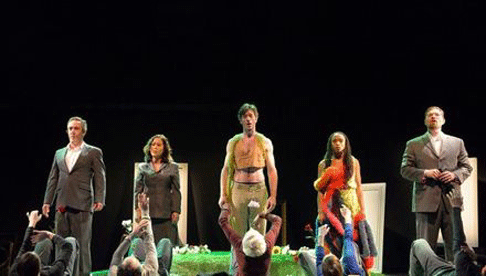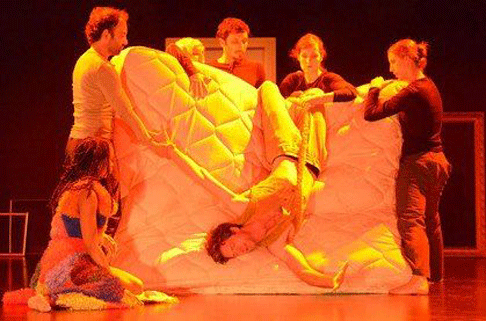![A scene from <em>Bonjour M. Gauguin</em> [Photo by Alessandra Mello courtesy of West Edge Opera]](http://www.operatoday.com/Gauguin1.gif)
11 Apr 2013
Bonjour M. Gauguin in Berkeley
Once Berkeley Opera, renamed West Edge Opera, this enterprising company offers the Bay Area’s only serious alternative to corporate opera, to wit Bonjour M. Gauguin.
English Touring Opera are delighted to announce a season of lyric monodramas to tour nationally from October to December. The season features music for solo singer and piano by Argento, Britten, Tippett and Shostakovich with a bold and inventive approach to making opera during social distancing.
This tenth of ten Live from London concerts was in fact a recorded live performance from California. It was no less enjoyable for that, and it was also uplifting to learn that this wasn’t in fact the ‘last’ LfL event that we will be able to enjoy, courtesy of VOCES8 and their fellow vocal ensembles (more below …).
Ever since Wigmore Hall announced their superb series of autumn concerts, all streamed live and available free of charge, I’d been looking forward to this song recital by Ian Bostridge and Imogen Cooper.
Although Stile Antico’s programme article for their Live from London recital introduced their selection from the many treasures of the English Renaissance in the context of the theological debates and upheavals of the Tudor and Elizabethan years, their performance was more evocative of private chamber music than of public liturgy.
Evidently, face masks don’t stifle appreciative “Bravo!”s. And, reducing audience numbers doesn’t lower the volume of such acclamations. For, the audience at Wigmore Hall gave soprano Elizabeth Llewellyn and pianist Simon Lepper a greatly deserved warm reception and hearty response following this lunchtime recital of late-Romantic song.
For this week’s Live from London vocal recital we moved from the home of VOCES8, St Anne and St Agnes in the City of London, to Kings Place, where The Sixteen - who have been associate artists at the venue for some time - presented a programme of music and words bound together by the theme of ‘reflection’.
'Such is your divine Disposation that both you excellently understand, and royally entertaine the Exercise of Musicke.’
‘And there was war in heaven: Michael and his angels fought against the dragon; and the dragon fought and his angels, And prevailed not; neither was their place found any more in heaven … that old serpent … Satan, which deceiveth the whole world: he was cast out into the earth, and his angels were cast out with him.’
There was never any doubt that the fifth of the twelve Met Stars Live in Concert broadcasts was going to be a palpably intense and vivid event, as well as a musically stunning and theatrically enervating experience.
‘Love’ was the theme for this Live from London performance by Apollo5. Given the complexity and diversity of that human emotion, and Apollo5’s reputation for versatility and diverse repertoire, ranging from Renaissance choral music to jazz, from contemporary classical works to popular song, it was no surprise that their programme spanned 500 years and several musical styles.
The Academy of St Martin in the Fields have titled their autumn series of eight concerts - which are taking place at 5pm and 7.30pm on two Saturdays each month at their home venue in Trafalgar Square, and being filmed for streaming the following Thursday - ‘re:connect’.
The London Symphony Orchestra opened their Autumn 2020 season with a homage to Oliver Knussen, who died at the age of 66 in July 2018. The programme traced a national musical lineage through the twentieth century, from Britten to Knussen, on to Mark-Anthony Turnage, and entwining the LSO and Rattle too.
With the Live from London digital vocal festival entering the second half of the series, the festival’s host, VOCES8, returned to their home at St Annes and St Agnes in the City of London to present a sequence of ‘Choral Dances’ - vocal music inspired by dance, embracing diverse genres from the Renaissance madrigal to swing jazz.
Just a few unison string wriggles from the opening of Mozart’s overture to Le nozze di Figaro are enough to make any opera-lover perch on the edge of their seat, in excited anticipation of the drama in music to come, so there could be no other curtain-raiser for this Gala Concert at the Royal Opera House, the latest instalment from ‘their House’ to ‘our houses’.
"Before the ending of the day, creator of all things, we pray that, with your accustomed mercy, you may watch over us."
The doors at The Metropolitan Opera will not open to live audiences until 2021 at the earliest, and the likelihood of normal operatic life resuming in cities around the world looks but a distant dream at present. But, while we may not be invited from our homes into the opera house for some time yet, with its free daily screenings of past productions and its pay-per-view Met Stars Live in Concert series, the Met continues to bring opera into our homes.
Music-making at this year’s Grange Festival Opera may have fallen silent in June and July, but the country house and extensive grounds of The Grange provided an ideal setting for a weekend of twelve specially conceived ‘promenade’ performances encompassing music and dance.
There’s a “slide of harmony” and “all the bones leave your body at that moment and you collapse to the floor, it’s so extraordinary.”
“Music for a while, shall all your cares beguile.”
The hum of bees rising from myriad scented blooms; gentle strains of birdsong; the cheerful chatter of picnickers beside a still lake; decorous thwacks of leather on willow; song and music floating through the warm evening air.
![A scene from <em>Bonjour M. Gauguin</em> [Photo by Alessandra Mello courtesy of West Edge Opera]](http://www.operatoday.com/Gauguin1.gif)
Once Berkeley Opera, renamed West Edge Opera, this enterprising company offers the Bay Area’s only serious alternative to corporate opera, to wit Bonjour M. Gauguin.
It was the reprise of an opera by an enterprising young Italian composer, Fabrizio Carlone (b. 1970) who promoted its premiere in Venice in 2005 that included the manufacture of a CD and DVD. No doubt short on cash West Edge Opera is long on creativity, the least of which was discovering this already far-away produced opera, thus saving the considerable costs of a first performance while offering the Bay Area the excitement of operatic discovery.
It was a pleasurable evening of something new, not just another Magic Flute, and we discovered more than a new opera — we were reminded of the French painter Paul Gauguin with more information than most of us ever knew.
And once again we witnessed a new generation, that of this young Italian composer, chanting its mantra of revolution and finding a new victim/hero to sing about.
 Anders Froehlich as Gauguin, Shawnette Sulker as his inner voice
Anders Froehlich as Gauguin, Shawnette Sulker as his inner voice
We learned that messieur Gauguin was not a very nice man who died enriched (finally) by his artistic and moral sweat — current sentiment does not seem to concern itself with condemning dishonorable behavior nor honoring penniless death. It was a sequential, exhaustive (about two hours) account of his life in snippets of his own and his contemporary’s words. An unusual libretto that was more a lecture about Gauguin and his art than a dramatic action.
It was in fact absolutely flat dramatically, the French language, by nature little inflected was in perfect accord with Mr. Carlone’s music that percolated underneath achieving quiet, never overly intense musical climaxes. And these emotional climaxes, of which there were a considerable number, were intellectual rather than visceral insuring an evenly illuminated two-hour musical and histrionic landscape.
The actions of geographic change were narrated. Gauguin’s reflections and his contemporaries reactions were recited. This prompted West Edge producers to embellish the lengthy text with abstract dance movement except when specific action was mimed in overt description. The staging was entrusted to Bay Area choreographer Yannis Adoniou who with his dance group Kunst-Stoff, a company of five dancers, energetically executed complex, unceasing movement. The odd number of dancers was evened to six (three male/female couples) when it was joined by Gauguin himself, dancer Anders Froehlich.
M. Froehlich is also an accomplished singer, a fine light baritone who achieved with apparent ease the refined lyricism required by the composer. If without the roughness and rudeness of the described Gauguin this singer fulfilled to near perfection the intellectual and conceptual elegance of the score and this production.
Composer Carlone’s Gauguin was complemented by an inner voice, the exotically costumed soprano Shawnette Sulker who is endowed with a rich voice that she used securely to fulfill the extensive and challenging coloratura requirements of the role. When joined by Gauguin and the three narrators, Keith Perry, Paul Murray and Nicole Takesono, Mlle. Sulker provided the brilliant upper edge to finely wrought five-voice ensembles that were among the musical highlights of the evening.
There were some staging resolutions that defied comprehension, like the bare innerspring mattress that was thrown about the stage nearly the entire evening. Had it related to the bed on which the artist Gauguin laid his naked Tahitian girl in Spirit of the Dead Watching we might have felt some visual structure to the staging of the opera.
 Keith Perry, Paul Murray and Nicole Takesono as Narrators, Anders Froehlich as Gauguin, Shawnette Sulker as his inner voice, and dancers
Keith Perry, Paul Murray and Nicole Takesono as Narrators, Anders Froehlich as Gauguin, Shawnette Sulker as his inner voice, and dancers
The action of Gauguin painting his Tahitian masterpiece Spirit of the Dead Watching occurred near the end of the opera, and was the biggest moment of the opera. It was mimed by Gauguin and described by Gauguin as well, and illustrated by photographic images projected on the large screen that dominated stage right. This splendid scene was of unusual intensity that even brought to mind Berlioz’ Benvenuto Cellini casting his statue of Perseus — a David and Goliath comparison, nonetheless germane.
This large screen however was unceasing illuminated throughout the evening by images of paintings that most often were by Gauguin, but often times were by other artists, rarely identified, prompting personal mental scurrying to identify the images and reconcile them to the narration. As well the English translation of the sung French was projected on this screen. Watching this screen and frantic thinking came into direct conflict with participating in the performance.
Conductor Mary Chun and the San Francisco Sound Group Orchestra were in the pit. Mme. Chun oversaw the realization of composer Carlone’s score with authority, precision and sensitivity. She created a musical warmth that encouraged the exceptional level of lyricism achieved by the singers, all in recognition of composer Carlone’s lyric gifts (he is Italian, so supposedly they come naturally).
The San Francisco Sound Group was comprised of nine players entrusted with illuminating composer Carlone’s pallet of, therefore, nine colors. A limited pallet for two hours of music. Composer Carlone’s pedigree is impeccable, including the Ferienkurs für Neue Musik in Darmstadt and the Académie d’été of Ircam in Paris. Thus much current European compositional technology is present in his basically neo-impressionist style. There was a plethora of textures, shapes and rhythms if not volume.
Michael Milenski
Cast and production:
Gauguin: Anders Froehlich; Inner Voice: Shawnette Sulker; Clovis Gauguin: Schuler Wijsen; Narrator #1: Keith Perry; Narrator #2: Paul Murray; Narrator #3: Nicole Takesono; Dancers: Yannis Adoniou, Jerremy Bannon-Neche, Lindsey Renee Derry, Katie Gaydos, Kate Jordan. The sfSoundGroup Orchestra. Conductor: Mary Chun, Stage Director/Choreographer: Yannis Adoniou; Lighting Designer: Lucas Benjaminh Krech; Video Designer: Jeremy Knight; Costume Designer: Shannon Maxham. El Cerrito High School Auditorium, April 6, 2013.